Migrant crisis: How can EU respond to influx?
- Published
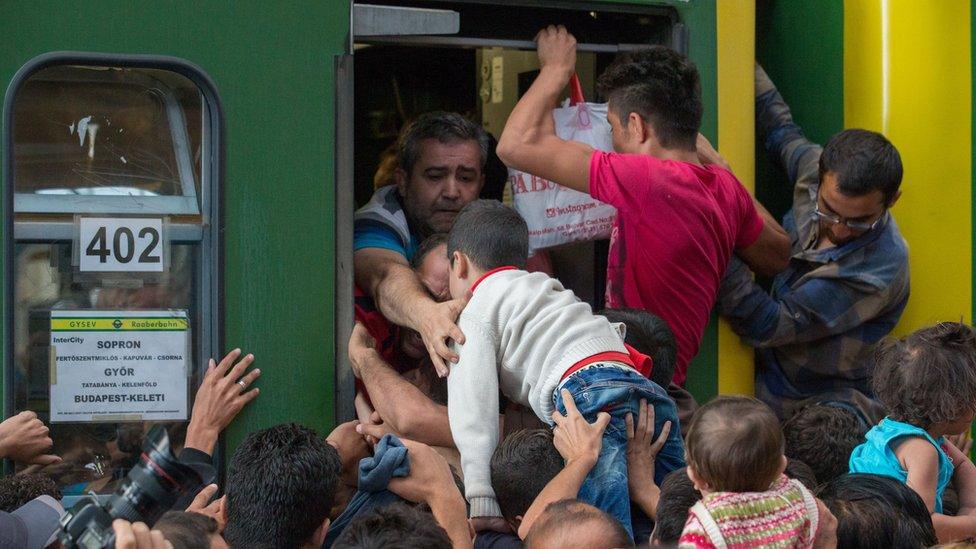
Many migrants have been squeezing onto trains in central Budapest bound for western Europe
The EU admits that its asylum procedures are inadequate, faced with the biggest influx of migrants since the Balkan wars of the 1990s.
Europe has been shocked by migrant tragedies in the Mediterranean and the misery of refugees - many from war-torn Syria - exploited by people traffickers.
So can Europe's governments, instead of accusing each other, take joint action to end the crisis?
Here are five key areas where EU agreement could at least ease the crisis.

Agreeing on asylum rules
Hungary has joined Greece and Italy as a migrant hotspot, overwhelmed by the numbers hoping to settle in the EU.
Reception centres in the "frontline" countries are overcrowded. In many cases officials are struggling with a flood of asylum claims.
Effective common rules would mean sharing data on migrants, such as fingerprints and other key ID, so that their movements could be tracked.
More EU specialist teams have been promised to help national authorities to filter migrants when they arrive and process claims speedily.
There also needs to be a complete revamp of the Dublin Regulation, under which the EU country where a migrant first arrives is supposed to process the migrant's asylum claim.
The system was not designed for a crisis like the current one.
In its European Agenda on Migration , externalthe European Commission says Dublin is not working. In 2014, just five EU states handled 72% of all asylum applications.
Hungary is arguing with its neighbours Austria and Germany over who should register thousands of asylum seekers.
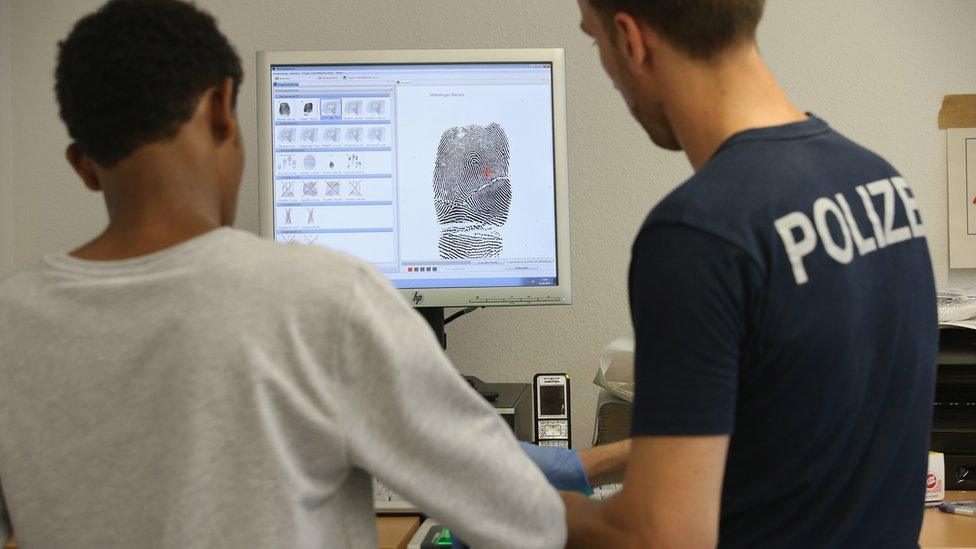
A fingerprint scan in Germany: There are calls for more EU data-sharing on migrants
The "frontline" countries, and some of their eastern European partners in the EU, say most migrants want to reach richer countries like Germany, Sweden and the UK. So they ask: why register and house migrants in a country they plan to leave anyway?
But the counter-argument is that governments should not shirk their humanitarian responsibilities. Under international law, genuine refugees - people fleeing war or persecution - have a right to asylum. And doing little or nothing to help them just prolongs their misery.

National asylum quotas
There is fierce argument over an EU proposal for national quotas, to share out the burden of asylum claims fairly. And there are growing calls to increase the number of people taken in.
The European Commission tried unsuccessfully to persuade member states to accept a mandatory quota system, external for taking in 40,000 Syrians and Eritreans over the next two years. They agreed in July to accept 32,500 on a voluntary basis.
The UK opted out of any quota, exercising a right it had negotiated. Ireland could have opted out too, but chose not to.
The UK now plans to take in up to 20,000 more Syrian refugees over the next five years, from camps in the Middle East.
Eastern European governments mostly object to quotas, saying migrants would not want to settle in their countries.
In a joint statement, external on 4 September, the leaders of the Czech Republic, Hungary, Poland and Slovakia said "any proposal leading to [the] introduction of [a] mandatory and permanent quota for solidarity measures would be unacceptable".
The leaders of Slovakia and Hungary also question the policy of "Christian" Europe taking in many Muslims. Many asylum seekers have fled from Syria, Iraq, Afghanistan and Pakistan - all Muslim-majority countries.
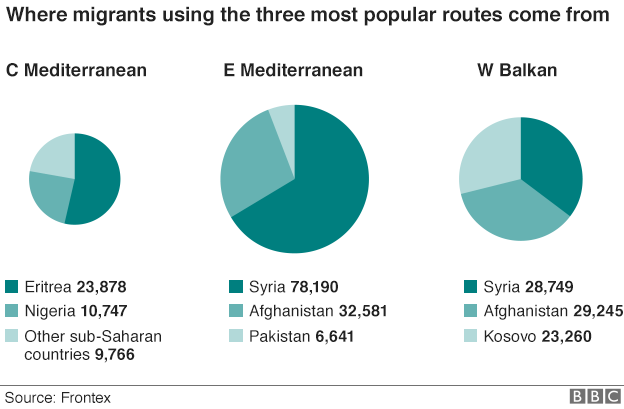
But the quota plan has not gone away. France, Germany and Italy are pushing for it.
The Commission is set to unveil a permanent EU mechanism for distributing asylum seekers across the 28-nation bloc.
Quotas would only apply to Syrian and Eritrean refugees, however, so the mechanism would not solve the crisis.
European Council President Donald Tusk wants a bigger target, external, calling for "fair distribution of at least 100,000 refugees".

Tackling migration at source
The EU has stepped up naval patrols off war-torn Libya - the source of many migrant tragedies at sea. There are plans to destroy the people smugglers' boats.
The UK government is among those emphasising the need to stem the flow of migrants at source, to stop their perilous journeys to Europe.
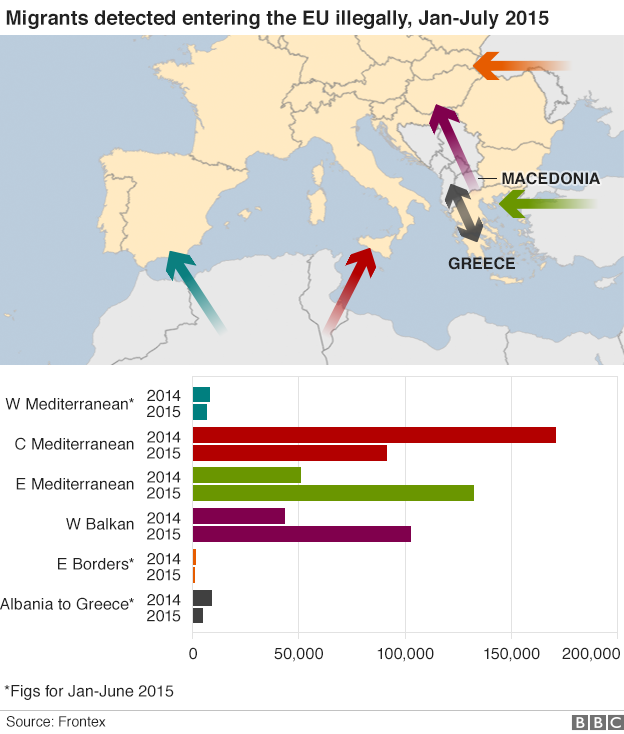
But the drivers of the current migration are complex and require long-term aid efforts by the EU.
Ending the war in Syria would make a huge difference - but that still looks a long way off. Syrians are the biggest group of migrants flocking to Europe.
More than four million refugees have poured into Turkey, Lebanon and other neighbouring countries from Syria. The UK is the biggest EU aid donor for those refugees and argues that most prefer to stay in the Middle East.
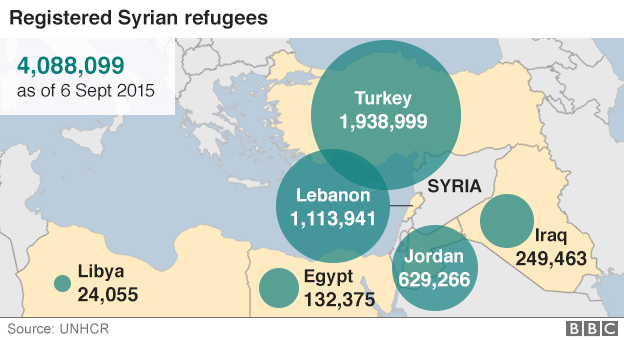
The rich Gulf Arab countries have taken in very few Syrian refugees - and critics are urging them to do more to help.
There is also massive emigration from Eritrea, where human rights abuses are rife. Ending its frozen conflict with Ethiopia would help reduce the numbers. But, again, the EU is divided over how to tackle that problem.
For sub-Saharan Africa, more targeted EU aid could create local jobs and reduce the flow of economic migrants.
But many also flee the deep-rooted conflicts in Nigeria, Sudan, Somalia and Democratic Republic of Congo, which require political as well as economic solutions. That demands a co-ordinated, ambitious EU foreign policy.
Mediterranean route
Between 1 January and 28 August:
322,914
migrants arrived in EU
2,432
people died
-
209,457 arrived in Greece
-
111,197 arrived in Italy
-
2,166 arrived in Spain

Legal migration paths
A big challenge for the EU is to set up reception centres in Africa and the Middle East to handle asylum claims. That would help prevent the ordeals and tragedies suffered by migrants crossing the Mediterranean.
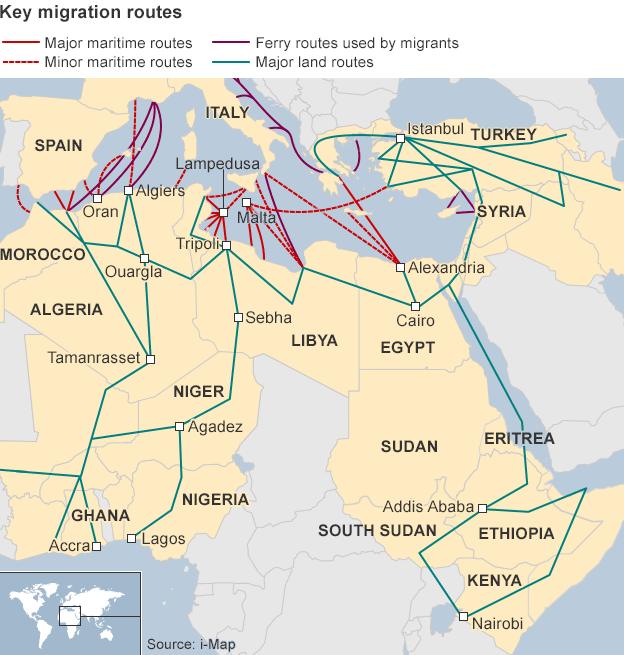
Mr Tusk, who chairs EU summits, has called for reception centres "closer to conflict areas outside Europe, where refugee camps already exist".
"These centres should be a way to get to the European Union for all asylum seekers," he said.
In an effort to curb people-trafficking from West Africa the EU will set up a pilot centre in Niger to spread information about Europe's immigration rules and the options for would-be migrants.
The EU has a Blue Card scheme for highly-skilled foreign professionals to get jobs in Europe, but take-up has been low because it competes with national schemes, external and is not used by the UK, Ireland and Denmark.
There are calls to set up a European scheme like the US Green Card Lottery, external for economic migrants, which issues 50,000 work visas to foreigners annually.
Jan Semmelroggen, an academic at Nottingham Trent University, argues that such a scheme could help ease the burden , externalon the EU asylum system.
Much of Europe has high unemployment, but there is strong demand for certain skills in the EU labour market. Germany, for example, wants many more engineers and computer specialists.
With ageing populations, there is a growing need for skilled migrants.

Sending migrants back
EU countries deport fewer than half of failed asylum seekers. People traffickers know that and exploit it, often taking thousands of pounds from each migrant for passage to the EU.
In 2014 EU countries ordered 470,080 to leave. In total 192,445 were deported. The UK topped the list for deportations - 48,890, Eurostat reports, external.
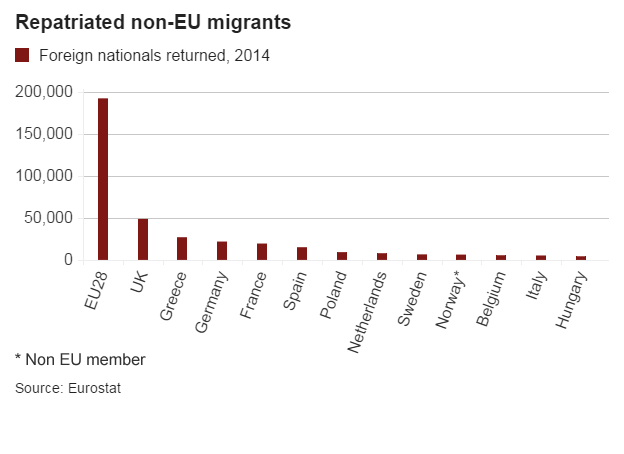
In 2014 only 45% of asylum claims were successful. For some nationalities almost all asylum requests were rejected.
There is pressure now for the EU to agree on a list of "safe countries of origin", which would give a legal basis for sending more migrants home.
Many migrants arriving in Germany have fled poverty in the Western Balkans - they are not refugees. There are calls for the EU to declare Serbia, Kosovo, Albania, Bosnia-Hercegovina and Macedonia all "safe".
That is problematic, however, as those countries want to join the EU - where freedom of movement is a core value.